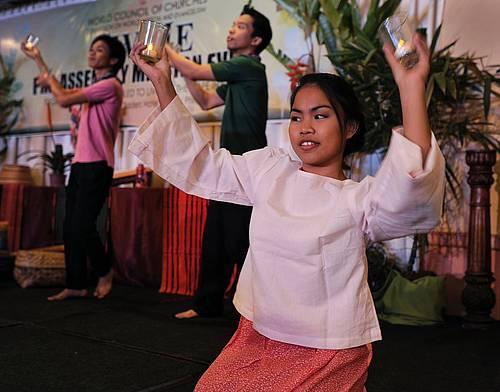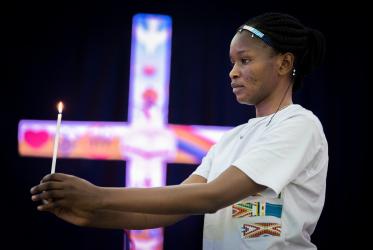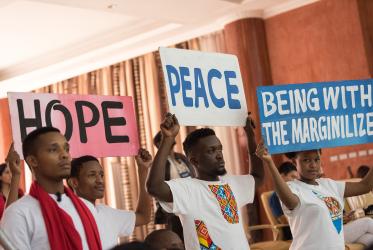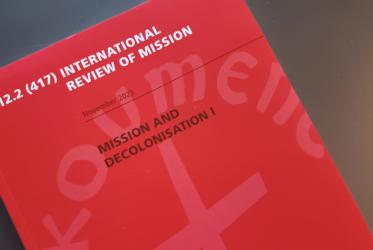The world has changed since 1958. In that year members of the International Missionary Council (IMC) met in Achimota, Ghana and proposed to move their operation into the World Council of Churches (WCC), then one decade old.
The change took place in 1961 with the creation of the WCC Commission on World Mission and Evangelism (CWME). Last week members of the CWME met again in Ghana to commemorate their 50th anniversary and mark the profound changes that have taken place in Christian mission and the realities of a world in which it is impossible to speak of Christianity without, for example, taking full account of Africa.
In 1958, explained the Rev. Dr Kwabena Asamoah-Gyadu, missionary work was widely understood as a movement of “vineyard workers” from the global north moving into the global south. “Now, the field has changed,” said the former principal of Trinity Theological Seminary in Accra, Ghana.
African immigrants in Europe, he said, are often accused of being a social “problem”. However, Christian immigrants see themselves as part of a solution and believe they are on a mission to bring Europe back to God.
Asamoah-Gyadu was one of three theologians and pastors who reminded the assembled CWME commissioners that mission and evangelism has been reversing itself, carrying the gospel from the global south to secularized regions of the north. The speakers made their case as part of the 50th anniversary celebration at Trinity Seminary on Saturday evening 27 November.
The argument was well received by the 25 CWME commission members, representing the Roman Catholic, Pentecostal and Evangelical churches in addition to member churches of the WCC. Many testified to their experience, in many regions, of the same shift in the dynamics of mission and evangelism. In the context of the Ghana meeting, Africa was seen as the prime example of a new Christian epicentre forming in the south.
Apart from the celebration of an anniversary, the commissioners devoted time and energy to the composition of a new common statement on mission and evangelism that is to be presented at CWME meetings in the Philippines in March 2012 and then sent for discussion and approval to the 10th Assembly of the WCC in Busan, South Korea in 2013.
In his remarks to CWME members and seminary students, Asamoah-Gyadu challenged his audience to consider the continuous erosion of denominational loyalties in Africa. This is particularly true among the young, he added, and “ecumenical bodies like the WCC and the All Africa Conference of Churches may have to undertake seismic changes to stay relevant in a rapidly changing global Christian landscape.”
Christian communities, a prime location for mission
He also drew attention to other realities that churches and ecumenical organizations have faced. Noting that “it is becoming virtually impossible to talk about Christianity without Africa”, he reported that the formation of theology and church structures among many African communities is taking place, apart from the historic missionary traditions of the global north.
Referring to disagreements over the ordination of gay and lesbian candidates for ministry, he observed that many ecumenical bodies and western churches “find it difficult to accept what Africans would find as a biblical position on some of the contentious issues of the day.”
Dr Opoku Onyinah, a CWME commissioner and Ghanaian Pentecostal leader, described how early missionaries brought hospitals, schools, alphabets, translation and other ground-breaking initiatives to African communities. Schools were among the main avenues and recruitment grounds for building the Christian church.
At the same time, they brought a wave of western cultural ideas and values. This led many to conclude that “the motive of Christian missions was associated with an alien culture.” Mission came to be seen as bearing “an intention of foreign influence.” Slavery, colonial exploitation and other forms of domination “painted a negative picture of mission” despite positive contributions by missionaries.
Onyinah concluded, “These events should inform us and provide lessons in shaping mission today and tomorrow.”
Dr Richard Baawobr, a Roman Catholic priest and superior general of the Missionaries of Africa, told the meeting that “the church is born from the missionary activity of God himself. God is constantly reaching out to invite us into communion with him.”
He continued, “It is this reaching out of God through his Son, through his Spirit, that has been continued in the community of believers of Jesus.” The proclamation of the gospel is ultimately God’s mission – missio Dei – not ours, not the church’s mission. We as churches and as the Church are invited to participate in God’s mission.
For Baawobr, the values of the kingdom of God – seeking justice, peace and reconciliation – are key elements of the mission to which Christians are called.
If the church wants to continue in God’s mission, Baawobr added, “we have to do it in community” as this is where people find support and strength. It is Christian community that provides “the prime location where mission finds its unity.”
The older concept of mission, he concluded, “as somebody going out from north to south or from east to west – that geographical, territorial conception of mission – is over, because mission is moving in all directions now.”
Read also:
Mission review looks at multicultural ministry (WCC press release of 21 April 2011)







